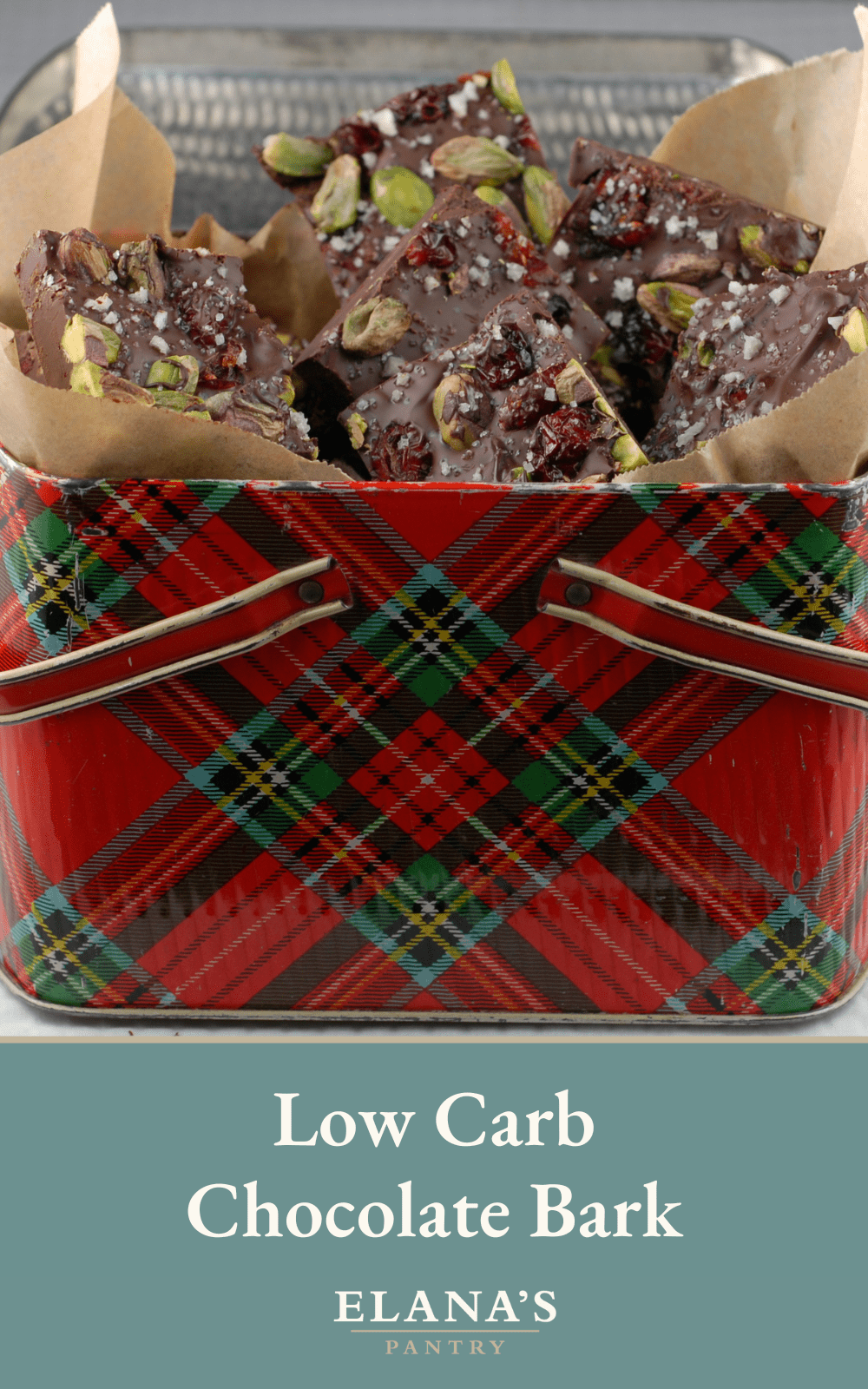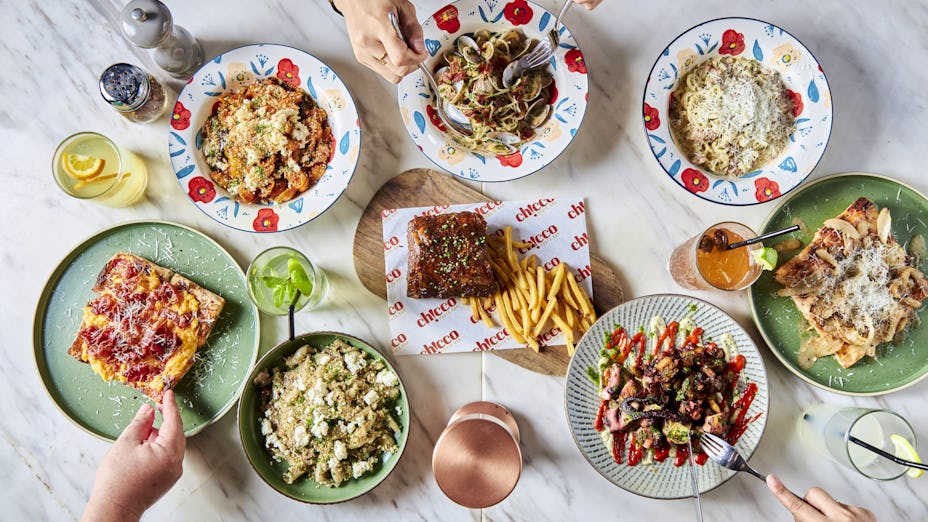Chicken Alfredo Recipe (EASY!) – Chelsea’s Messy Apron

This rich, indulgent, and creamy Chicken Alfredo Recipe brings restaurant-quality to your table, but couldn’t be easier to make! It’s robustly flavored with minimal ingredients and can be ready in about 30 minutes or less!
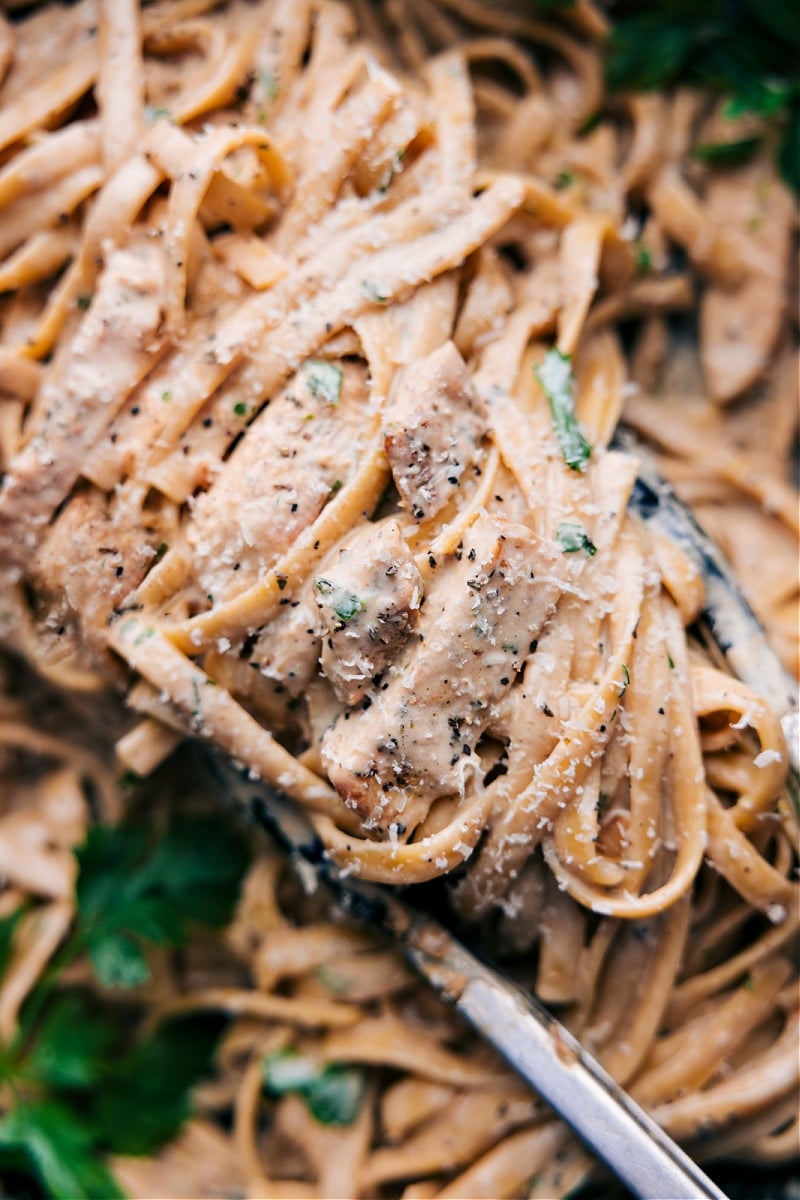
A Simple Chicken Alfredo Recipe
I’m always amazed how much restaurants charge for a plate of Chicken Alfredo–especially when it’s one of the easiest meals to make from home. And truthfully–you can make it every bit as good (if not better) than your favorite restaurant in about 30 minutes or less.
In fact, this recipe is almost identical to the one served at the restaurant I used to work at. And that dish sold for over $20 a portion!
The secret? You’ll need to make this easy recipe with heavy cream. If you’re looking to make the best Chicken Alfredo recipe, milk or half and half won’t cut it here. We need real cream!
Even though we are using cream, this recipe uses far less cream (about half as much) than called for in other recipes and that’s because we use an Italian secret that essentially stretches the sauce further. That “secret” is using some reserved pasta boiling water for the sauce.
If you are still concerned about using cream or looking to cut down on fat/calories, you’ve got to try this lightened-up, no heavy cream Chicken Alfredo or this healthy Chicken Broccoli Alfredo. (But for true, restaurant quality Alfredo, cream is a must!)
QUICK TIP
And if you’re interested in the nutrition numbers for heavy cream, here they are: Heavy cream contributes 205 calories, 22 grams of fat, 14 grams of saturated fat, 1.6 grams of carbohydrates, and 1.2 grams of protein per serving. Indulgent? Yes. Over the top: Not really.
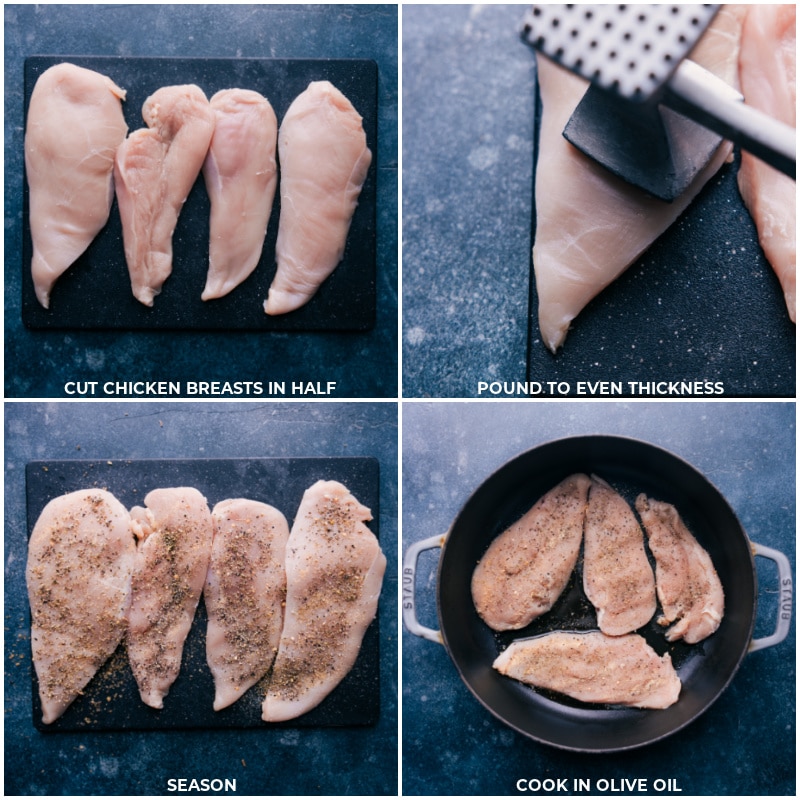
How To Season Chicken For Alfredo
A few seasonings can go a long way when making Chicken Alfredo. In fact, we only use four seasonings: salt, pepper, garlic powder, and Italian seasoning.
- In a pinch, using only salt and pepper will still deliver delicious results.
- We love the savory flavor that garlic powder adds, but if you aren’t a fan, leave it out or swap it out for onion powder.
- If you don’t have Italian seasoning, try some dried parsley, basil, oregano, or a combination of a couple of those dried herbs.
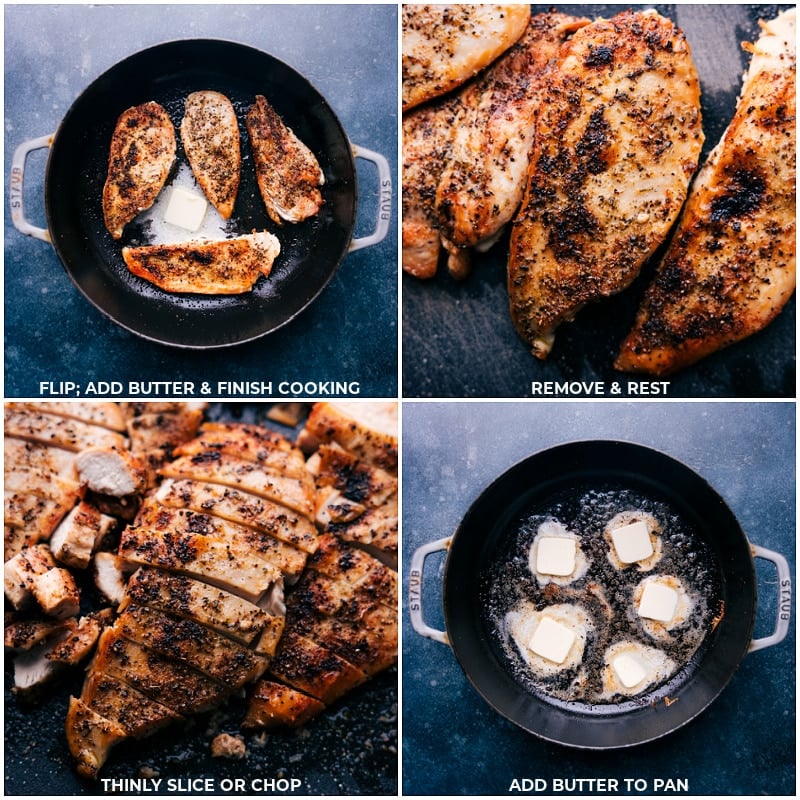
Remember how I promised the best Chicken Fettuccine Alfredo in 30 minutes or less? Here’s the trick to cooking chicken quickly!
How To Cook Chicken For Chicken Alfredo
Take 2 medium-sized skinless, boneless breasts and cut each in half to get 4 thinner filets. And when we say to cut them in half, cut them into thinner filets, not shorter ones–so you could open the chicken breast like the pages of a book. (This way the chicken will cook up ridiculously quickly and evenly on the stovetop–no need to transfer to the oven.) Add the filets in a single layer to a hot pan and cook (undisturbed) for about 3-4 minutes per side–fast and easy!
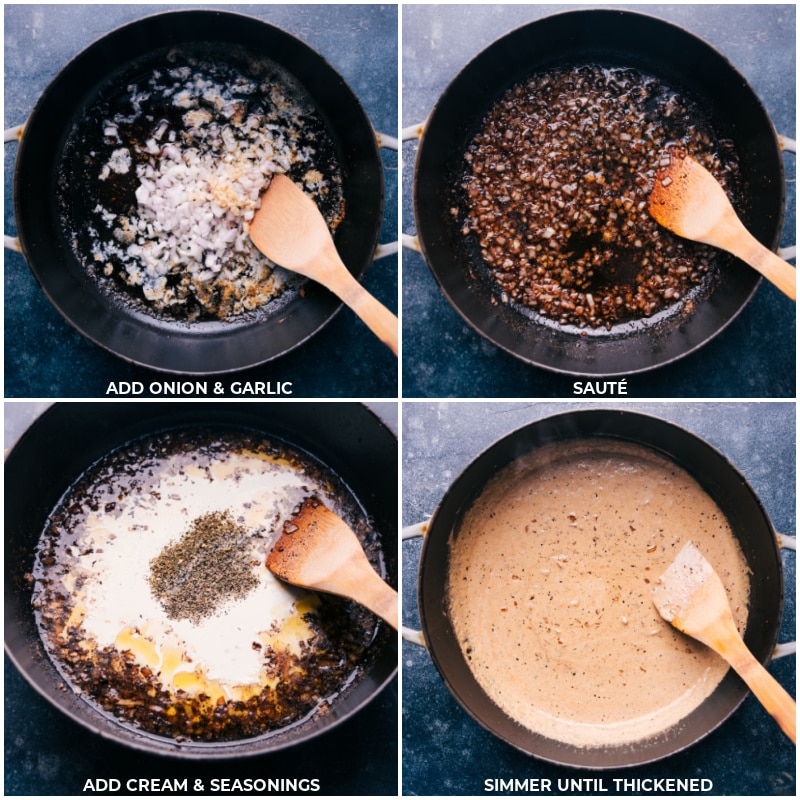
How To Make Chicken Alfredo
- Salt the pasta water: Salting the water is the only chance you have to season the actual pasta, so make sure the fettuccine is well salted as it cooks–otherwise this entire Chicken Alfredo Recipe will taste under-seasoned.
- Cook chicken and let it rest: Once the chicken is cooked, remove it to a plate and tent with foil. Let it rest before dicing or thinly slicing. Resting will deliver juicy and tender bites of chicken.
- Toss together sauce: While the chicken is resting, prepare the sauce–it takes just minutes to whip together and thicken.
- Emulsify! Now here’s the secret to the best Italian pasta recipes–emulsifying! Tossing the hot pasta with the Alfredo sauce and reserved pasta water is called emulsifying and that’s how you get a wonderfully smooth and flavorful sauce that clings to the pasta instead of falling to the bottom of the pot!
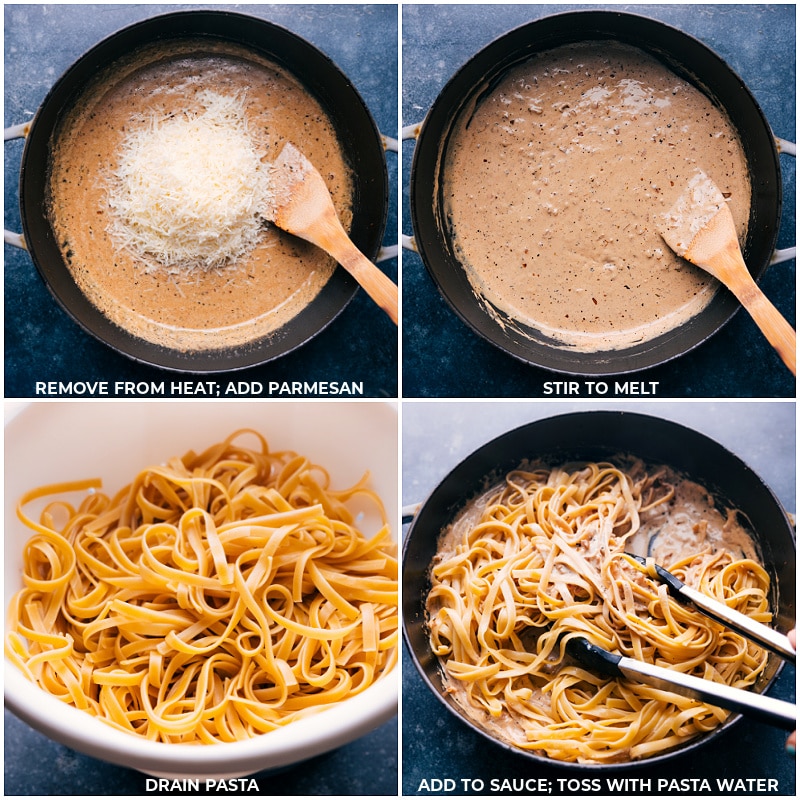
VARIATIONS
Change Things Up
- Make this Chicken Alfredo Recipe with jarred sauce. While the from-scratch Alfredo sauce is so easy to make, if you prefer to use a jar, Rao’s ®Alfredo is our favorite!
- Prepare this Chicken Alfredo Recipe with broccoli. This is such an easy ingredient to add! Two minutes before the pasta will be done, add in either fresh or frozen broccoli (cut into bite-sized pieces). Drain alongside the pasta and toss into the sauce.
- Try our Baked Chicken Alfredo recipe to use the oven instead of the stovetop.
- Make Chicken Alfredo with Penne pasta instead! In fact, just about any pasta will work here–be sure to use 16 ounces.
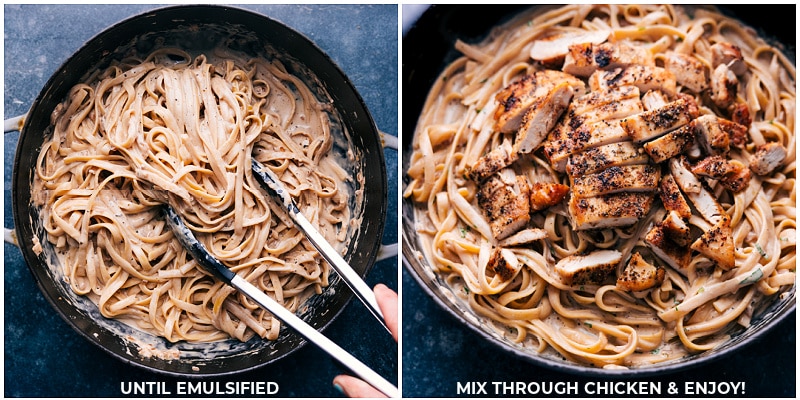
Below are a couple of ingredients worth discussing for this Chicken Alfredo Recipe.
Chicken Alfredo Ingredients
- Parmesan: This ingredient makes the biggest difference to the overall flavor in this recipe. And while this recipe is designed to be quick and easy, don’t try to short-cut the cheese. Do not use canned or pre-shredded/grated Parmesan–the sauce won’t work as well. (The cheese doesn’t melt smoothly and you’ll be left with a big clump.) Instead, go for a block of cheese and grate it on the small sides of a grater or microplane. If you’re looking for some extra umph, try Parmigiano Reggiano–it’s incredible in this dish.
- Onion: If you’re looking to cut out some prep time or simply don’t like onions, use onion powder instead (or neither!) If you are using an onion, be sure to very finely chop it (smallest possible pieces) so it sautés quickly and integrates into the dish well. If there are big pieces of onion it will be overpowering (and crunchy) in this recipe.
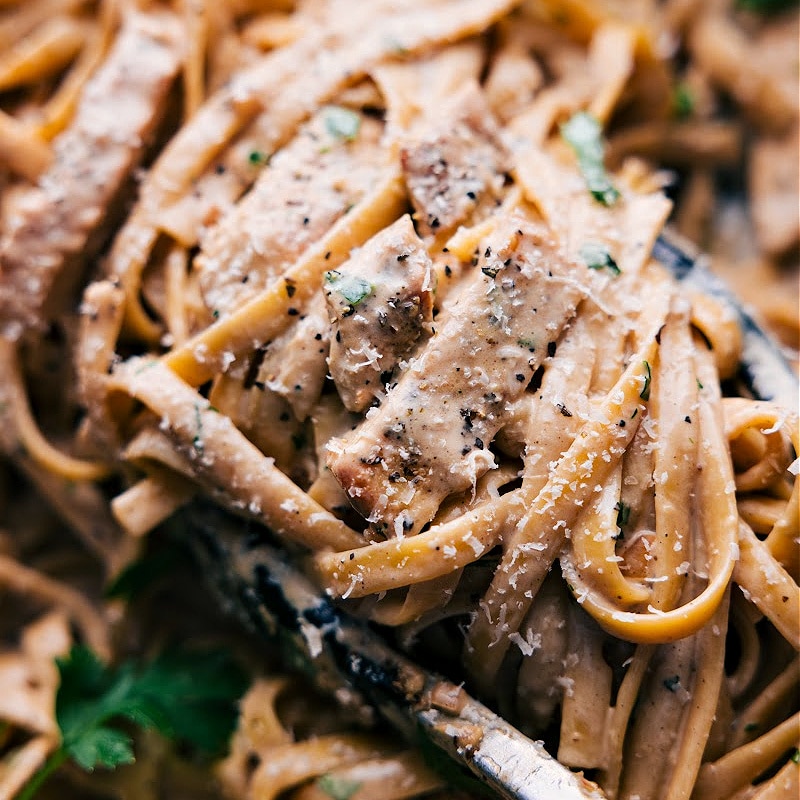
Chicken Alfredo Recipe FAQs
1What can you add to Alfredo to enhance the flavor?
Make sure you’re cooking the chicken for this recipe rather than relying on already cooked rotisserie chicken. Why? Because we’re relying on the leftover “browned bits” from cooking the chicken to add a depth of flavor to the Alfredo sauce.
Other ways to add more flavor:
- Just a tiny pinch more of salt and pepper can be a game changer (yes, really!).
- Increase the seasonings–a touch more garlic powder or Italian seasoning can go a long way!
- Use good cheese–the better the cheese, the better the Alfredo is going to taste!
2What seasoning tastes good in Alfredo?
Salt, pepper, garlic powder, onion powder, and Italian seasoning are my favorites in Alfredo. If you’d like some acid, a squeeze of lemon juice is a nice flavor add. And if you’re looking for even more jazz, try some freshly grated nutmeg.
3How do you get Alfredo sauce to stay creamy?
The secret to keeping Alfredo sauce creamy is using the reserved pasta water. The minute the pasta starts to look dry, add another splash of reserved pasta water and toss until the sauce is nice and creamy again.
4Is heavy cream or milk better for Alfredo?
Heavy cream is essential to making the best Alfredo sauce–it delivers a wonderful thickness and richness.
5How do I jazz up my Chicken Alfredo?
Add in some other ingredients to jazz up your dish. Here are some of our favorites:
- baby spinach (coarsely chopped)
- sun-dried tomatoes packed in oil (drain and coarsely chop)
- sautéed mushrooms
- sautéed peppers
6What is the difference between Chicken Alfredo and chicken fettuccine?
The difference is that Chicken Alfredo is made with a creamy white sauce while Chicken Fettuccine can be made with any kind of sauce (creamy or not, red or white, etc.).
7What is in Chicken Alfredo sauce?
Alfredo sauce is an indulgent creamy white sauce made from leftover “browned bits” from the chicken, butter, diced onion, minced garlic, heavy cream, salt and pepper, Italian seasoning, and freshly grated Parmesan cheese.
8Is Alfredo sauce just white sauce?
Alfredo sauce is an indulgent-tasting, rich and creamy white sauce that goes with cooked pasta.
Authentic Italian Alfredo is typically made with butter, freshly grated cheese, and plenty of reserved pasta water.
STORAGE
Storing
This homemade Chicken Alfredo recipe is best enjoyed the minute the sauce is emulsified. In fact, this is when all pasta dishes taste their best!
You can certainly store leftovers, but you’ll need to add some more heavy cream or chicken broth to loosen the sauce again as you reheat the pasta. Leftover pasta will be softer, but still plenty flavorful. Because of the pasta and dairy in this dish, it isn’t a great candidate for freezing and thawing.
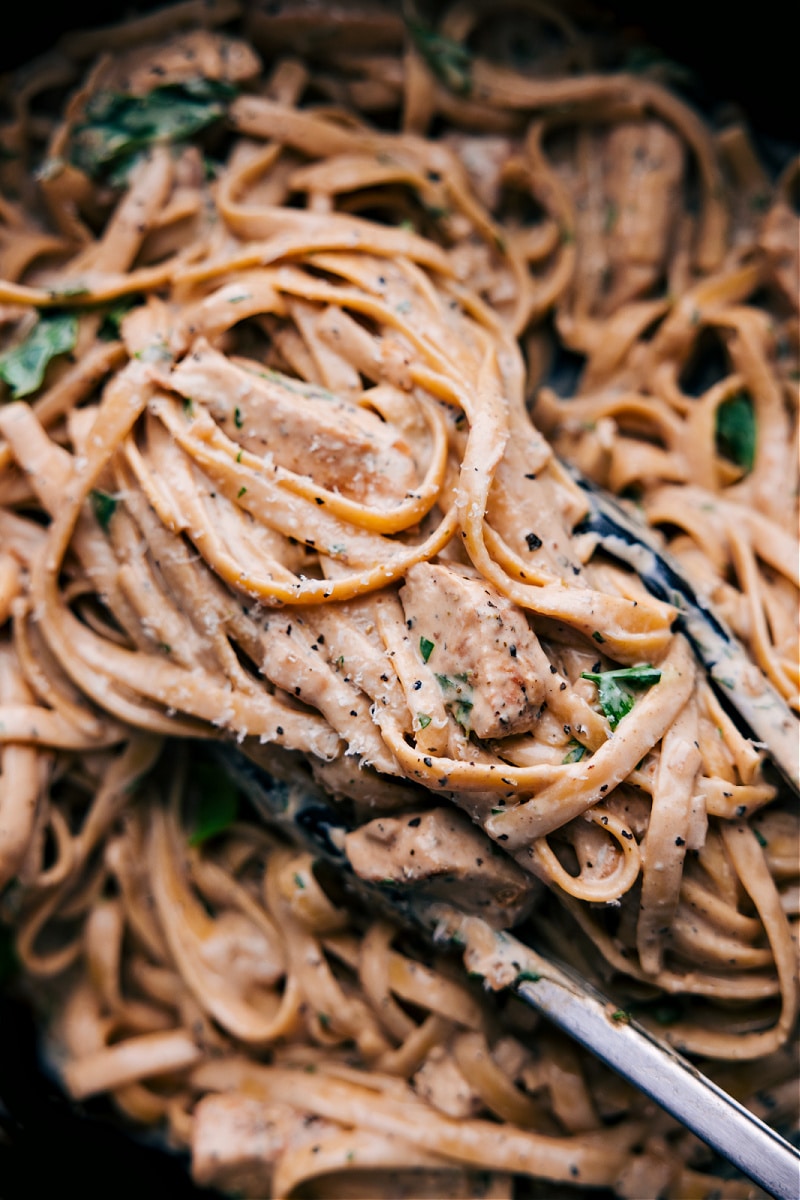
QUICK TIP
Do you struggle to remember to save some pasta water before draining the pasta? I know I do! Here’s a trick: Place the colander in the sink with a mug or heat-safe measuring cup in the center. When you go to drain the pasta, you’ll see the mug and be reminded to pull out some water first!
What To Serve With Chicken Alfredo:
Garnish this Chicken Alfredo recipe with some fresh and finely chopped herbs and an extra sprinkle of cheese. Then, serve one or a couple of the following on the side:
Chicken Alfredo Recipe
This rich, indulgent, and creamy Chicken Alfredo brings restaurant-quality food to your table, but couldn’t be easier to make! It’s robustly flavored with minimal ingredients and can be ready in about 30 minutes or less!
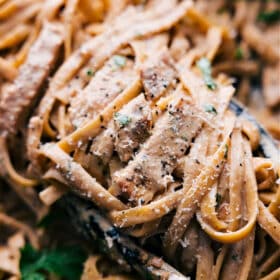
Chicken Alfredo Recipe

This rich, indulgent, and creamy Chicken Alfredo brings restaurant-quality food to your table, but couldn’t be easier to make! It’s robustly flavored with minimal ingredients and can be ready in about 30 minutes or less!
Instructions
-
PASTA: Heads-up: you’ll need to save pasta water before draining! Bring a large pot of water to boil. Once boiling, add in 1 tablespoon fine sea salt. Add in all the fettuccine pasta and boil, stirring occasionally, until it’s “al dente” according to package directions (lowest time indicated on package). Before draining, remove 1 cup of pasta water. Drain; do not rinse in cold water.
-
SEASON CHICKEN: Cut chicken breasts in half widthwise to make four thinner filets. Use a meat mallet/frying pan/your fist to give each piece a quick pound (Don’t flatten chicken; we just want all the pieces fairly even in width). Season both sides. (I add about 1/4 teaspoon of salt & pepper per side and 1/2 teaspoon garlic powder and Italian seasoning per side.)
-
COOK CHICKEN: Add 2 tablespoons olive oil to a large, wide, heavy-bottomed skillet or pot (big enough to hold all the pasta later). As soon as the oil is hot, add the seasoned chicken pieces in one layer. Cook for about 3-4 minutes then flip and add 1 tablespoon butter to the skillet. Cook another 3-4 minutes or until chicken is cooked through (registers 160 degrees/juices run clear); remove to a plate and tent with foil and rest for about 5 minutes before thinly slicing or dicing.
-
SAUCE: In same pot (don’t wipe it out), add 6 tablespoons butter (cut into tablespoon-sized pieces) and melt over medium-high heat. Once melted, add in onion and garlic and stir, scraping up browned bits leftover from the chicken. Sauté until tender, about 3 minutes. Pour in the cream plus salt & pepper (I add 1/4 tsp of each). As soon as mixture boils, turn heat down to medium low. Simmer until thickened, about 1-3 minutes. (Note 3)
-
SAUCE CONT.: Once thickened, remove pan from heat. Stir in the fresh, finely grated cheese until melted and sauce is mostly smooth. Dump the drained pasta right on top of the sauce, along with 1/2 cup of the reserved pasta water. Turn to medium heat and toss gently with tongs until the pasta and sauce emulsify (cling together) nicely. This takes about 1 minute. Add more pasta water if needed (if it’s looking dry/stodgy–Note 4) Add diced chicken to the pan and gently stir through. Taste for seasoning, adding more salt/pepper if needed.
-
ENJOY: Remove from heat and serve right away! Garnish plates with fresh parsley plus a sprinkle more of cheese if desired.
Recipe Notes
Note 2: Parmesan: This ingredient makes the biggest difference to overall flavor in this recipe. And while this recipe is designed to be quick and easy, don’t try to short-cut the cheese. Do not use canned or pre-shredded/grated Parmesan–the sauce won’t work (cheese doesn’t melt smoothly and you’ll be left with a big clump). Instead, use a block of cheese to freshly and finely grate on the small sides of a grater or microplane. If you’re looking to really up your Alfredo game, try Parmigiano Reggiano–it’s incredible in this dish.
Note 3: Thickness check: The sauce should be thick enough to coat the back of a wooden spoon. Lift up the spoon and immediately trace a line across the back of the spoon with your fingertip. If the line retains a clear track, the sauce is thick enough. If not, the sauce needs to be simmered a bit longer.
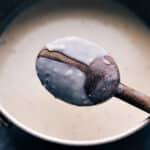
Note 4: Pasta water: The Alfredo sauce should be silky smooth and cling to the pasta. If at any point it gets stodgy, thick, or grainy, just drizzle in some more pasta water and toss again. This should smooth it out nicely!
Nutrition Facts
Calories: 1171kcal | Carbohydrates: 89g | Protein: 53g | Fat: 67g | Saturated Fat: 35g | Polyunsaturated Fat: 5g | Monounsaturated Fat: 20g | Trans Fat: 1g | Cholesterol: 320mg | Sodium: 831mg | Potassium: 858mg | Fiber: 4g | Sugar: 5g | Vitamin A: 1916IU | Vitamin C: 3mg | Calcium: 427mg | Iron: 3mg
We do our best to provide accurate nutritional analysis for our recipes. Our nutritional data is calculated using a third-party algorithm and may vary, based on individual cooking styles, measurements, and ingredient sizes. Please use this information for comparison purposes and consult a health professional for nutrition guidance as needed.


